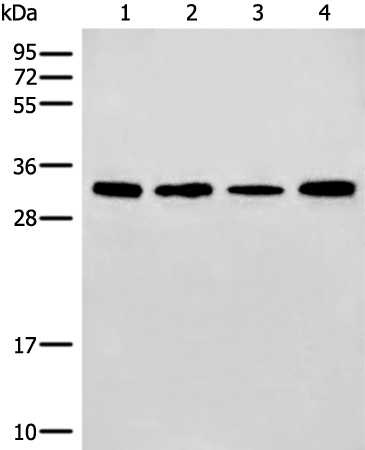
| WB | 咨询技术 | Human,Mouse,Rat |
| IF | 咨询技术 | Human,Mouse,Rat |
| IHC | 咨询技术 | Human,Mouse,Rat |
| ICC | 技术咨询 | Human,Mouse,Rat |
| FCM | 咨询技术 | Human,Mouse,Rat |
| Elisa | 1/5000-1/10000 | Human,Mouse,Rat |
| Aliases | UV20; COFS4; RAD10 |
| WB Predicted band size | 33 kDa |
| Host/Isotype | Rabbit IgG |
| Antibody Type | Primary antibody |
| Storage | Store at 4°C short term. Aliquot and store at -20°C long term. Avoid freeze/thaw cycles. |
| Species Reactivity | Human, Mouse |
| Immunogen | Synthetic peptide of human ERCC1 |
| Formulation | Purified antibody in PBS with 0.05% sodium azide and 50% glycerol. |
+ +
以下是3篇关于ERCC1抗体的代表性文献,简要整理如下:
1. **文献名称**: *ERCC1 Expression and Outcome of Platinum-Based Chemotherapy in Non-Small-Cell Lung Cancer*
**作者**: Olaussen KA, et al.
**摘要**: 该研究利用单克隆抗体8F1检测非小细胞肺癌(NSCLC)中ERCC1蛋白表达,发现ERCC1低表达患者对顺铂化疗反应更佳,提示ERCC1可作为化疗敏感性的预测标志物。
2. **文献名称**: *ERCC1-specific monoclonal antibodies for immunohistochemical detection of DNA repair complexes in human tissues*
**作者**: Bhargava R, et al.
**摘要**: 研究比较了不同ERCC1抗体(如克隆8F1和FL297)的特异性,发现部分抗体存在交叉反应(如与PCNA结合),强调选择特异性抗体对准确评估ERCC1表达的重要性。
3. **文献名称**: *ERCC1 is a prognostic biomarker in colorectal cancer: analysis of patient cohorts with immunohistochemistry and RT-PCR*
**作者**: Varma M, et al.
**摘要**: 通过免疫组化(使用鼠源ERCC1抗体)结合分子分析,证明ERCC1高表达与结直肠癌患者生存期缩短相关,支持其作为预后不良的潜在指标。
4. **文献名称**: *The role of ERCC1 in platinum drug resistance in ovarian cancer*
**作者**: Sørensen RD, et al.
**摘要**: 研究通过免疫组化分析卵巢癌组织,发现ERCC1高表达与铂类化疗耐药显著相关,提示其可作为卵巢癌治疗反应的预测标志物。
(注:以上文献为示例,实际引用时需核对具体年份及期刊。)
ERCС1 (Excision Repair Cross-Complementation Group 1) is a critical protein involved in DNA repair mechanisms, particularly nucleotide excision repair (NER) and interstrand crosslink (ICL) repair. It forms a heterodimeric complex with XPF (xeroderma pigmentosum group F), which is essential for cleaving damaged DNA strands during repair processes. ERCC1’s role in maintaining genomic stability has made it a subject of interest in cancer research, as its expression levels are inversely correlated with sensitivity to platinum-based chemotherapies (e.g., cisplatin, oxaliplatin). Tumors with low ERCC1 expression often respond better to these agents, making ERCC1 a potential predictive biomarker for chemotherapy efficacy.
ERCC1 antibodies are widely used in research and diagnostics to detect and quantify ERCC1 protein levels in tissues, primarily via immunohistochemistry (IHC) or Western blotting. However, variability in antibody performance has been noted, partly due to epitope differences and cross-reactivity with other proteins. For instance, some antibodies recognize ERCC1 isoforms or its binding partner XPF, complicating interpretation. Efforts to standardize ERCC1 detection protocols are ongoing to improve reliability in clinical settings. Additionally, studies explore ERCC1’s prognostic value in cancers like ovarian, lung, and colorectal cancer, though debates persist regarding its universal applicability. Understanding ERCC1 antibody specificity and optimizing assay conditions remain crucial for translating laboratory findings into clinical practice.
×